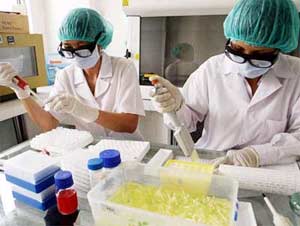The Vietnamese Ministry of Health is ready to grant permission to pharmaceutical companies intending to import cancer vaccines into Vietnam. The initial focus of this ‘campaign’ is the cervical cancer vaccine.
 |
|
Vaccine Research Room (Photo: VNN) |
On May 3rd, Dr. Nguyễn Văn Bình, Deputy Director of the Department of Preventive Medicine (Ministry of Health), announced that the American organization PATH in Vietnam has submitted a proposal to the Ministry of Health to conduct a pilot project for testing the Human Papillomavirus (HPV) vaccine (which prevents cervical cancer) for approximately 9,000 female adolescents aged 14-15.
According to the information provided by this organization, HPV is a very common infection (more than 50% of adults are infected with this virus). 99.7% of cervical cancer cases are related to HPV, and the progression from HPV infection to cervical cancer takes about 20-30 years.
Currently, alongside Merck & Co. and GlaxoSmithKline, another major American pharmaceutical company is researching and conducting trials for HPV. These two companies have conducted trials on female patients aged 15-26 in various countries, including the USA, Canada, Australia, Hong Kong, Thailand, the Philippines, and Finland. The results of these trials have been very promising. Therefore, PATH is proposing to expedite trials in Vietnam.
According to Dr. Nguyễn Văn Bình, so far, all relevant departments, divisions, and institutes have agreed in principle to implement this pilot project. However, the remaining issue is to thoroughly assess the quality of the vaccine and its effectiveness.
These units have also requested PATH Vietnam to complete the legal paperwork for the vaccine (production license, quality standards, and circulation permit in Vietnam), and to collaborate with qualified and capable entities to develop the clinical trial documentation for the vaccine in accordance with current regulations (including scientific content and ethical considerations in research) as a basis for approval by the Scientific and Technical Council and the Ethics Council of the Ministry of Health before official implementation.
By the end of 2006, the implementation of HPV vaccine trials is expected to commence in Vietnam.
It is known that Vietnam detects tens of thousands of new cervical cancer cases each year, making it the second most prevalent cancer among women, nearly as high as breast cancer rates.
According to the Vietnam Cancer Society, approximately 120,000 new cancer cases are detected each year, and this number is on the rise. Among the mentioned causes are the degradation of living environments and the increasing use of processed foods containing chemicals whose harmful effects are not yet fully understood.

















































